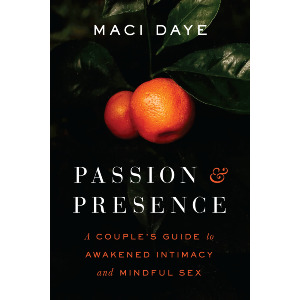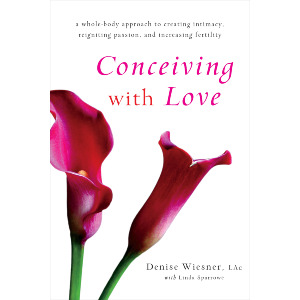

Maci Daye
Maci Daye is a licensed professional counselor, certified Hakomi therapist, and certified sex therapist. In addition to clinical practice, she is on the faculty of the Hakomi Institute and teaches in the United States and Europe. She is the creator of Passion and Presence® couples' retreats and a frequent conference presenter. She regularly leads courses in the USA, Australia, New Zealand, and Europe. She holds graduate degrees from Harvard and Georgia State Universities.
Maci Daye
GUIDES

Taking it to the Sheets: Mindful Sex

An excerpt from Passion & Presence
Taking it to the Sheets: Mindful Sex
So, what exactly is mindful sex? What images come into your mind at the mention of “erotic presence”? Are you seeing two people breathing in synchrony as they gaze lovingly into each other’s eyes? If you imagine penetration, are you seeing slow thrusts?
Mindful sex is not necessarily “slow sex.” Nor is it an alternative to lusty or even “rough” sex. Any kind of sex can be mindful. It is the quality of presence that we bring to whatever type of sex we are having right now. This presence is curious and allowing. With erotic presence, we can feel ourselves emotionally, energetically, and physically. The inner observer has open eyes, enabling us to notice our thoughts, habits, and impulses throughout the experience.
Although there is no single experience of mindful sex, I’ve identified five features that make it a wakeful adventure. Some of these features reflect the spirit or attitude of mindful sex; others refer to the practice or state of consciousness that supports being open and wakeful.
The Five Features of Mindful Sex
1. Eliminating goals and reference points
2. Embracing both the joys and challenges bundled with sex
3. Accepting the impermanence that runs through our erotic life
4. Cultivating a state of novelty
5. Becoming present and embodied
Let’s look at the list in more depth. Each of the five features begins with a question or set of questions.
1. Eliminating Goals and Reference Points
How would it be to enter an erotic experience without a destination or frame of reference?
Mindful sex keeps us coming back to the “spacious mind” of our pure erotic potential. In this state, we are free from goals and reference points that stifle the potential creativity available in the here and now. We practice noticing—again and again—when we are becoming automatic or goal oriented. At such times, we pause and wait for the next impulse to see where it might take us rather than plowing ahead.
From a spacious mind, we might find ourselves drawn to stroking our partner’s body in a new way. Alternatively, we may become newly aware of where and how we want to be touched at this moment. When we release ourselves from “destination tyranny” by emptying our mind of goals and reference points, we become curious explorers. We accept like any intrepid adventurer that sometimes the path we thought was to an exotic mushroom turns out to be a muddy dead end. With a spacious mind, we re-wild our sex life by exploring new trails.
2. Embracing Both the Joys and Challenges Bundled with Sex
Do you assume that sex should always be good, if not great?
When it comes to sex, most of us chase pleasure and judge challenges and “just okay” sex as bad news. However, real-life sex can have incredible highs as well as multiple frustrations, just as real-life vacations can include flight delays or bungled hotel reservations. While we may believe that sex should be consistently fulfilling, many sexual experiences are okay, at best. Research tells us that more than 50 percent of the time, sex will be more enjoyable for one of us than the other.
Expecting sex always to be comfortable and satisfying is like hoping the weather will be sunny 365 days of the year. Like the weather, our sex life can be hot and steamy, stormy, or dry. We can be in a drought for months, even years. Nevertheless, couples who claim togetherness in sickness and health may lose said devotion when their sex life goes south. With mindfulness, we can begin to embrace the full range of our sexual experiences as a couple as we develop a nonjudgmental attitude toward them all.
Stage 3 couples do just that; they appreciate their delightful, deeply satisfying encounters as well as those that are awkward and disappointing. They shift their orientation so that sexual variability is merely evidence of the mystery of eros, rather than a problem to solve. With this mind-set, even unsatisfying experiences become grist for the mill. As Sengstan, in the Hsin Hsin Ming put it, “The Great Way is not difficult for those who have no preferences.”
3. Accepting the Impermanence That Runs through Our Erotic Life
Are you willing to surrender your attachment to a particular outcome or view of “great sex”? Can you let go of the so-called good times and bad? Why do intense moments of pleasure only slip through our grasp when we try to recapture them later?
Our best sexual experiences are like soap bubbles, delicate and short-lived. Even the Big O is normally only seven to twenty seconds long. Trying to keep our sex life the same is like saving a pressed flower. It will forever be just an echo of its former self, lifeless and without fragrance.
The good news is that something as good or better than your best sex is waiting for you right now. You will miss it if you try to reprise the oldies but goodies, or judge your sex life by your last few unsatisfying encounters. As you may have seen in the thought experiment earlier, our expectations determine what is possible between us. If we have the idea that our sex life is a problem, we are likely to be cautious and avoidant of sex.
Mindfulness can help us not attach to a particular experience of sex—good or bad. It can release every sexual experience back into the stream of ongoing experiences we are likely to have as a couple. Having goals can create attachment toward future experiences and cause rejection of current moments together. Holding on to reference points can lead us to want to replicate past experiences, the satisfying as well as the unsatisfying. When we let go of our attachment to specific experiences, we allow ourselves to discover pathways to pleasure that fit what is realistic and desirable for us right now.
If your sex life has been less than wonderful, try to empty yourself of expectations and inner models. This practice is what stage 3 couples do each time they make love. They release their images of what their best and worst sex is like and meet freshly. If you let go of your reference points, then whatever is happening right now is your “best sex.”
4. Cultivating a State of Novelty
In a spirit of exploration, are you willing to see how mindfulness can convert an ordinary and familiar sexual encounter into something novel?
Ellen Langer is a social psychologist at Harvard University who has been studying mindfulness for more than forty years. Her findings indicate that when we look for novelty in familiar places, we anchor ourselves in the present. Because we are engaged, we enjoy ourselves and are more creative. I believe she’s right.
Mindful sex follows an internal rhythm, not a sexual script. We listen inside for the eros energy that pulses through us. When we liberate ourselves from the pressure to reach a goal and erase our images of sex, our experience becomes a free-form jam session. Instead of kissing our partner’s body with our lips, we might draw different shapes with our tongue, making a painting with our mouth. Instead of going up and down with our head, we might zigzag across our partner’s genitals and hum, enjoying the vibrations we feel inside of our mouth.
We awaken our PEP by following erotic impulses as they arise moment to moment without succumbing to automatic moves and routines. Sometimes our riffs will be mind-blowing, sometimes one or both of us may not be feeling the music. Whatever happens is okay. Acceptance is a crucial element of traditional mindfulness as well as mindful sex.
By improvising instead of playing tired standards, we access infinite possibilities rather than going straight for an orgasm. Of course, not every single stroke, kiss, or lick will be a first. However, the combination will be unique, and so will the energy behind it. Our playfulness, passion, and intimacy are born of the moment and therefore are fresh and unrepeatable.
5. Becoming Present and Embodied
What if you want to feel aroused but have trouble doing so? How does sensation get coded as pleasure?
Some of us have bodies that talk to us through a megaphone. Our internal sensations may be so intense that we want to cover our ears. Others of us can go all day long without eating or drinking and never feeling hunger or thirst. Mindfulness can help you feel yourself from the inside, including your turn-on. This process is called “interoception.” When you link your pounding chest to fear and your growling stomach to hunger, you are using interoception, or your “felt sense.” The same system helps you recognize sexual arousal.
The brain’s insula is ground control for your felt sense. It is the re-lay station between body and brain and supports erotic attunement. Research by Sara Lazar indicates that mindfulness practice thickens the insula. In one study, this resulted in more intense orgasms for women. British Columbia’s Sexual Health Lab provides conclusive evidence that mindfulness can restore desire, arousal, and sexual functioning in women with arousal disorders related to gynecological cancer and sexual abuse.
Developing your sexual felt sense is essential to erotic attunement, which is the ability to feel your partner while you are feeling yourself during an erotic exchange. As we will see in chapter 6, the art of mindful sex is learning how to engage in an unscripted call-and-response. We do this by feeling and responding to each other’s nonverbal cues.
You can develop your sexual felt sense by telescoping in on the sensations in your body that accompany arousal. When you bring focused attention to the body, you converse with your nervous system. Corresponding regions of your brain light up in the places where you are receiving physical contact, but only if you bring awareness to those areas.
If you are receiving wanted sexual stimulation, your feelings of arousal and your genital response synch up, resulting in “sexual concordance.” The higher your brain-genital concordance, the more likely you are to experience pleasure during sex. You can increase this concordance by using mindful awareness to notice the feel of the feelings you experience when you touch yourself and when your partner licks, kisses, sucks, or scratches you in different parts of your body.
Focused awareness on the body counters our tendency to go into our head and builds our capacity to concentrate and stay present. Each time your mind goes anywhere but here, gently bring it back to the body via your senses. If you are distracted or numb, you won’t notice the rich-ness of the moment, and you won’t experience the pleasure-enhancing benefits of sexual concordance. By becoming present and embodied, you can experience new worlds without leaving the bedroom
Beyond the Body: Wakeful Sex
Sensing at the body level builds concentration and enhances sexual concordance. We can also go wide-angle. We can use the “open focus” of our awareness to notice how our life themes, limiting beliefs, and habitual behaviors display themselves on the erotic stage. By seeing, and then pausing and studying our experience moment by moment, we bring awareness to the customarily hidden shapers of our experience. “Wakeful sex” wakes us up from our habits and trances.
We may start to ask newer questions of ourselves. For example: Are we waiting for our partner to initiate because we feel too shy to do so ourselves? We may wonder how giving up on shaping an erotic experience expresses our relationship to power. Does hiding our sexual wishes protect us from disappointment or reflect an underlying belief that other people’s needs are more important than our own? What do our habits regarding initiating, expressing, giving, and receiving tell us about our early conditioning? What did we imprint about sex? About pleasure? About love?
We can investigate everything that diminishes our PEP, including protective strategies and the emotions behind them. For example, with the help of mindful awareness, we recognize that after sex, we are chronically dissatisfied. By staying curious, we notice that underneath our dissatisfaction is an unwillingness to ask for what we want. Beneath our reluctance is the fear that something is wrong with us for having “kinky” desires in the first place. And, behind that is our shame. Voilà!
Waking Up, Gently
The things we can notice when we have sex mindfully are endless. How-ever, as our PEP-limiting tendencies become visible to us, we may fear that our habits are too entrenched for us to experience anything new with our long-term partner. We may believe we have too many internal roadblocks to ever come close to our PEP. In turn, we may judge our-selves or want to give up the practice of mindful sex.
It is natural to become discouraged when we see the usually hidden aspects of our mental and emotional life. It is for this reason that meditation teachers throughout the ages have encouraged practitioners to stay loving and curious toward themselves as they observe their habitual patterns. Self-aggression is the wrong spirit. Waking up is an act of love, not a whack on the head. “It is only when we begin to relax with ourselves as we are that meditation becomes a transformative process,” claims the American Tibetan nun and author Pema Chödrön.
Waking ourselves up is a lifelong project, not a race. Falling into a trance state is not unique to sex; we will fall into trance states whenever we fall asleep, even briefly. Many things, including automatic scrolling on our phones, can create a trancelike state. Our tendency to sleepwalk through life—and especially sex—is why regular mindfulness practice is essential. New habits are hard-won but can take hold with training, intention, and willingness to face the “pull” of our old ways.
In Sanskrit, the word mukta means “released.” The intent of mind-fulness within Buddhism was to help us to recognize and find relief from suffering born of a misapprehension of reality. Mindfulness helps us gently wake up from distorted perceptions and beliefs that have become automatized and can lead to trancelike states. We can learn to shift from being fused with such states to becoming a curious and compassionate witness to our states.
This process is called “disidentification”. Disidentification is like going into a bigger room. Instead of seeing just the bedroom, we see the entire house. Instead of seeing only the house, we see the whole neighborhood. And, with each widening of perception, we become wiser, have more choices, and access more PEP. A regular mindfulness practice can help us cultivate the inner observer as we free ourselves from trance states and PEP-limiting mind-sets.
Waking Up from the Performance Trance
Are you ready to let go of a “bigger, better, more” mentality?
Sex sells. Advertisers, movie producers, and book publishers capitalize on this fact. Unfortunately, the media’s portrayal of eroticism perpetuates a myth that partner sex is always hot, mutually satisfying, and spontaneous. It isn’t, but you already know this. Or do you?
Enticed by the enjoinder to “be the best we can be,” many of us go to great lengths to become sexual Olympians—learning techniques to become masterful lovers instead of discovering inside-out pathways to pleasure. The naked truth is this: satisfaction lies in the call-and-response of two attuned people who are not aiming but are letting eros lead.
In performance trance, we forget this. We strive to reach specific benchmarks like arousal, orgasm, or intercourse. Our attention turns away from the moment to concerns about competency: We silently wonder, am I wet, hard, or sexy enough? Is my technique okay? Usually, we answer ourselves with a “no.” The danger of this trance is that we will never be a “good-enough” lover, and this can only mean, in all likelihood, that we will never have “good-enough” sex.
Mindfulness is an antidote to the “bigger, better, more” mentality that undergirds the performance trance. As we saw in the first of the five features listed above, we release ourselves from destination tyranny when we pause and savor the moment. If we notice we are striving for the next great thing, we pause to regain a spirit of exploration that is guided by our curiosity. As we shift from performing to exploring, we realize that our PEP has nothing to do with being an accomplished lover. An achievement mentality only creates sexual anxiety and leads to avoidance, warns the researchers Barry McCarthy and Lana Wald.
Remember Walter and Ingrid? Four months after our first meeting, the couple returned for part 2 of our Tending Eros series. The tension I felt being with them before had all but disappeared, along with the toe-tapping restlessness I had noted in Walter. I’m eager to hear about their journey, but avoid steering the session with too firm a hand. I wait, and surprisingly, so do they.
We look at each other for about a minute; then Walter begins: “I’ll be honest, it took some time for us to surrender our ‘fight mode,’ as you called it. I’ve been competitive all my life. Everything I have has come from my effort and determination.” He continues by saying, “I’m a pragmatist, and if my strategy isn’t getting me results, I’m willing to try a different approach. One day on the train, I read something that reminded me of what you said at the last retreat about the cult of perfection and the ‘Olympian imperative’ to score a perfect 10 in all areas of life.”
Walter continues, “A few days after we got back, we agreed that every single time I was straining to make something happen during sex, we would stop.” Ingrid laughs, “That was about ten times in the first two minutes.” She continues, “Sex had always been a serious business for us, but we just kept laughing. It got so ridiculous that we thought we would never get to sex, but at one point we just looked into each other’s eyes and something shifted.” They are looking at each other that way right now. It is intimate and loving. “Walter held me, and his eyes welled up,” says Ingrid, speaking more softly than moments before. “I could feel he was in his heart.” Again, they pause to look at each other.
“We decided to play the impulse game you told us about in the retreat. Walter asked, ‘What’s your impulse?’ Surprisingly, I wanted to be tied up.”
If we are present and listening inside, we may want to add a prop or toy, which is different from artificially incorporating something into our lovemaking to fill the novelty prescription.
Ingrid continues, “Walter went into the garage to get some rope, but it didn’t feel right. I suggested he grab the silk belt off my robe. Then, I asked him, ‘What’s your impulse?’ and he said, ‘To tie your wrists to the bedposts.’ We were still playful, but I also felt nervous. I am usually very active during sex. In fact, until that moment, I hadn’t realized how much control I like to have during sex. I paused to study my reaction, and we talked about it, which was also new. I like to use my hands to stimulate Walter, but I couldn’t. We remembered you telling us to let whatever is coming up be part of the dance. So, we tried to think of a way that I could be passive and in control.”
“Here’s where it gets fun,” says Walter. “We decided that Ingrid would tell me what to do. If I did what she asked, she would stroke me with her feet. If I didn’t do it exactly right, she would use her feet to push me away.” “It was exciting and awkward because I couldn’t use my hands to stimulate Walter like I usually do,” Ingrid adds. “Nothing we were doing felt natural. That’s when I realized how goal oriented I am. It’s not just Walter.”
Self-awareness is the gift of mindful sex. We notice our tendencies by observing how we are feeling and behaving while making love. Instead of avoiding unpleasant feelings, we pause to study them. We choose to make necessary adjustments to feel more comfortable and use our discoveries to shift habits that may no longer be serving us.
Ingrid continues, “I decided that instead of trying to pleasure Walter, that I would taste and smell him. Surprisingly, I could feel more of myself when I did that. I noticed small waves of arousal moved through my body when Walter put his penis inside my mouth. I thought of the image of the homunculus you showed us at the retreat with those big swollen lips, and I decided to feel the nerve endings inside of my lips. I just kept staying curious and open, feeling the different sensations in my mouth.”
“Eventually, my arms got tired, so I asked Walter to untie me.” Walter decides now is a good time to chime in. “I really wanted to be inside of Ingrid and was starting to mount her in my usual missionary way, but instead, we decided to lie on our sides and face each other.” “That was almost too much,” Ingrid admits, but I can see that Walter is looking at Ingrid with admiration. They continue telling me more details of their sex play, including the moment when they paused because they were losing aliveness. Ingrid explains, “I needed to know that Walter was okay with all this, and he told me that he was.” “It sounds like you believed him,” I say. She searches his face now for confirmation and Walter nods.
“That evening was unique, for sure,” says Walter. “We haven’t had anything quite like that adventure since, but it hasn’t been ‘business as usual’ either.” I reiterate that sex can be a creative improvisation when we surrender goals and are present to the moment. This potential doesn’t mean that every experience will be fantastic, but that is okay.
Inevitably, we will sometimes fall back on our patterns, especially when we are tired, because presence is expensive, energy-wise. Automaticity enables us to do things without having a presence of mind. However, Ingrid and Walter now know that the possibilities are endless when they listen inside for the next impulse instead of pushing to reach a goal. They can relax during sex and make things up as they go along. They realize that how they are during sex shapes their experience much more than what they do in bed.
Waking Up from the Familiarity Trance by Recovering Curiosity Again and Again
In the familiarity trance, we approach sex with the same tired eyes. We let our bodies do what they do without being awake to the experience unfolding between us.
Mindfulness trains us to meet fresh every time. Instead of fixing our partner to the first frame of a lifelong movie, we become reacquainted with our partner’s mind and body on an ongoing basis. We recover curiosity for the unseen ways our partner is changing in front of our eyes.
Like Carla and Miguel, Gina and Elizabeth had spent nearly two decades in the familiarity trance. They were so busy with their business and taking care of their eleven-year-old daughter that they rarely had time for sex. They laughed at my suggestion to “see fresh,” but this simple exercise turned out to be a game changer for the couple and renewed their sexual spark. I also encouraged them to go outside the well-etched tracks of their familiar routines and take new paths during sex. At home, I suggested they nurture each other more because they had become used to interacting like business partners rather than lovers.
When we met six weeks later, Gina and Elizabeth were a different couple. I wondered what accounted for the lighthearted flirting that I was witnessing between them. Both women began speaking, then paused, and graciously offered the other the lead. Gina accepted: “We were skeptical when we left your office that things could be as good or better than they were in the early days, but that evening Elizabeth offered to brush my hair before bed rather than falling asleep on the sofa. She used to brush my hair when we first got together, but I thought those days were over.”
“I felt so much tenderness from Elizabeth that I started moving toward sex. Elizabeth stopped me, which was surprising and intriguing at the same time. I felt like she was playing hard to get when she is the one who usually presses me for sex. Elizabeth asked me to remove my robe, and I obliged, though I felt oddly shy. She looked at me for a long time and put her head on my belly like she used to do before our daughter was born. It was so tender that I began to weep. That night we snuggled all night long.”
Gina continues with the story: “The next morning, we kissed for a while and then I pushed Elizabeth’s head to my crotch, but she didn’t taste me. Instead, she began describing my genitals like they were a work of art. I could feel currents of energy going down to my toes when her hand grazed my vulva. I had never felt anything like it. It was like having sex without being sexual, but it was very intense. That experience opened something in me. I felt a renewed sense of trust and appreciation for Elizabeth; like after all these years, we could find each other again.”
If you think these stories are too good to be true, I have news for you: you already have a wonderful partner too—you just forgot to notice. “Wonder” and curiosity are both inextricably linked. As we become curious about who is here now, beneath the petrified roles of day-to-day living, we can experience the wonder of novelty with our long-term partner regularly.
Elizabeth now takes a turn at reporting: “Last week, Gina rubbed my feet as she often does while we watch television. This time, she put on some music and blindfolded me. I had no idea what was happening, but I completely surrendered.” Gina jumps in again, “I made rubbing Elizabeth’s feet a mindful touch exercise where I let myself stay curious and exploratory. I became intensely engaged with merely feeling the texture of her skin, including the crevices between her toes.” “Afterward, we had some of the hottest sex we ever had,” says Elizabeth, “even though we were both exhausted. I have to say that I never thought I would feel this way again. It’s like I’m with Gina and with someone new.”
When we are enchanted in stage 1, we don’t have to work to be present because novelty draws us to each other like iron to a magnet. Because of novelty and our heightened arousal, we are naturally more present. We notice intimate details about the shape of our beloved’s fingers and wrists. We record facial expressions that convey disappointment or delight. These details are mesmerizing because they are new. Eventually, we lose sight of the details, relying instead on impressions we formed at an earlier time. Wayne Dyer reminds us, “If you change the way you look at things, the things you look at change.” Instead of seeing the “same old thing,” we can see fresh.
Try this now: Shift your attention from what I am saying to how the words appear on the page. Give yourself a good couple of minutes to pay close attention to the shape and size of the letters and the thickness of the paper. Imagine you are from another planet that doesn’t have books.
You don’t know what this object is for, only that it has unidentifiable symbols. Smell and touch the paper, the spine, front, back, and sides of this book. What are you noticing about the book now that you didn’t see before?
We can do this “seeing fresh” practice with our partner, who unlike a book, is changing every day. Greg Johanson, a founding trainer of the Hakomi Institute, writes that “humility” rather than “certainty” helps us find each other again. With mindfulness, we delete the cache and listen, look, and touch freshly. We can train our eyes to look for novelty in familiar places and, in so doing, recover our curiosity again and again.
Through erotic presence, the ordinary becomes extraordinary because we are here to enjoy it. If the inner observer’s eyes are open, we can also see our habits in real time, particularly those that diminish our PEP. Befriending our natural eroticism through mindfulness and mindful touch makes the cultivation of novelty an “inside job,” and helps us access our PEP more regularly.
Related Books





